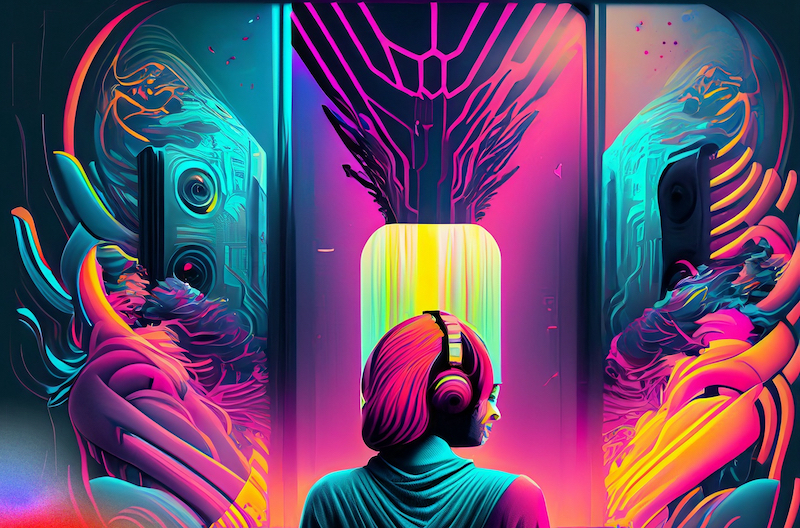The music industry is no stranger to innovation. From vinyl records to cassette tapes, CDs to digital streaming, the way we consume music has continuously evolved. But today, we are on the cusp of something really different. AI voice cloners have taken center stage and they are going to reshape the way we think about creativity.
With their ability to mimic human voices with uncanny precision, AI voice cloners offer a world of possibilities. Imagine creating an entire symphony of unique voices, or collaborating with your favorite artists from decades past. But as with any powerful tool, there is a question of balance. Can AI enhance human creativity, or does it risk compromising the very essence of artistry?
In this exploration of the future of artistry, we’ll dive into the world of AI voice cloners and examine their impact on human creativity. We’ll hear from artists who have embraced this technology and learn how it has shaped their creative processes. And we’ll explore the ethical and philosophical implications of this new era of music.
AI’s Role in Music: A Brief Overview
The integration of AI into the music industry has been nothing short of transformative. From songwriting and composition to mixing and mastering, AI has become an indispensable tool for artists and producers alike. But the advent of voice-based AI tools has ushered in a new era of possibilities.
AI voice cloners are the latest addition to this ever-evolving landscape. Unlike traditional voice changers, which merely alter the pitch or tone of a voice, AI voice cloners can create entirely new voices that sound indistinguishable from real human voices. This technology has opened the door to a world of possibilities, from creating unique vocal textures to reviving the voices of iconic artists from the past.
The concept of voice cloning is not entirely new. For years, artists and producers have experimented with various techniques to manipulate and modify voices. But the emergence of easily accessible AI voice cloners has taken this concept to new heights. With their ability to learn and mimic the nuances of human speech, AI voice cloners offer unprecedented levels of realism.
The Art of Voice Cloning
At its core, an AI voice cloner is a machine learning model trained to replicate the characteristics of human speech. It works by analyzing samples of real human voices and learning the subtle nuances that make each voice unique. Once the model has been trained, it can generate new voices that sound remarkably similar to the original samples.
The potential applications of this technology are vast. Artists can use AI voice cloners to create unique vocal textures, experiment with different styles, or even bring back the voices of iconic artists. This technology offers a new level of creative freedom that was previously unimaginable.
But it’s not just about creating new voices. AI voice cloners can also be used to enhance existing voices. For instance, you could add layers of harmonies to your vocals, or create a choir of voices from a single recording.
The Pros: Enhancing Human Creativity
- Unlimited Possibilities: Whether you create a custom AI voice based on your own, or use ai voice cloning to replicate an existing voice, the potential is absolutely limitless. Picture a TikTok in which AI Trump discusses the merits of pineapple on pizza or a parody Youtube video in which AI Eric Cartman gives a TED talk on world peace.
- Singing Made Accessible to Anyone: if you’re more interested in mastering your singing voice, a custom AI voice can easily fix all of the imperfections while retaining the organic quality of your voice. You can check out examples of this here.
- Collaborative Efforts: AI voice cloners offer new opportunities as artists can work with vocalists from around the world, without the need for expensive studio time or travel. This technology can offer access to an immense number of different AI voices, allowing creators to experiment with genres and styles like never before.
The Cons: The Double-Edged Sword of AI voice cloners
- Loss of Authenticity: While AI voice cloners offer limitless possibilities, they also raise questions about authenticity. If a song features the voice of a legendary artist, is it genuinely their voice or a meticulously crafted AI rendition? The blurred lines between reality and AI-generated content pose a challenge for artists, fans, and the industry at large.
- Over-reliance: As with any tool, there’s a risk of over-reliance. If everyone starts using AI for voice generation, will the industry lose its diversity? We could potentially end up in a scenario where distinct vocal signatures, those nuances and imperfections that make music feel human and raw, become harder to find.
For those using a custom AI voice, they may also consider not working as hard on improving their natural voice, and instead keep relying on this technology to fix all their singing imperfections. - Ethical Dilemmas: Voice cloning also brings forth a plethora of ethical concerns. Do we have the right to resurrect the voices of the deceased or use existing celebrity voices? Even if it’s technically possible, is it morally justifiable to create new content in someone’s voice? As of 2023, the legalities state that it all depends on the context and usage.
The Artists’ Perspective
Many forward-thinking artists have wholly embraced the potential of AI voice cloners. They view it as a tool that enhances their creativity, allowing them to experiment in ways they never thought possible. Rolling Stone highlighted artists who leverage AI not as a replacement but as a collaborative partner in their music creation process.
While many artists appreciate the potential of AI in music, some express reservations. Concerns often center around the loss of authenticity and the potential for AI to diminish the value of human artistry. As Pankaj Prasoon points out in his LinkedIn article, creativity is a distinctly human trait, and while machines can mimic or replicate, they cannot genuinely “create” in the human sense.
Balancing Creativity and Technology
With every technological advancement comes a period of adjustment, and AI voice cloners are no exception. To harness their potential without sidelining human creativity, a balance must be struck.
- Ethical Guidelines: One approach is the establishment of ethical guidelines surrounding the use of AI voice cloners. This could involve ensuring transparency in how AI-generated voices are used, setting boundaries on posthumous voice cloning and a system for getting explicit permissions.
- Promote Human-AI Collaboration: Instead of viewing AI as a threat, artists can see it as a collaborative partner. AI can handle certain tasks, like generating background vocals, while the artist focuses on the main composition, lyrics, and primary vocals.
- Educate and Inform: As with all new technologies, education is crucial. Artists, producers, and even listeners should be well-informed about how AI voice cloners work, their potential benefits, and the associated risks. Platforms like SXM Media offer insights that can guide both professionals and enthusiasts in navigating this new terrain.
Does AI Voice Cloning Affect Listener Experience?
Music isn’t just about the artists and producers; it’s fundamentally about the fans. So, how do these AI innovations affect the audience?
For many, AI voice cloners represent the future of music, enabling richer, more complex soundscapes. Listeners can now experience “dream collaborations” between their favorite artists, both past and present. Ever wondered how a duet between Freddie Mercury and Billie Eilish might sound? With AI, such fantastical musical experiences might just become a reality.
While AI offers unparalleled possibilities, some purists prefer their music untouched by algorithms. For them, the emotional connection to a song comes from knowing the human struggles, stories, and soul behind it. The challenge will be striking a balance between innovation and maintaining this emotional integrity.
With AI Voice Cloning, we might soon see interactive albums where fans can choose which artists they want to hear in a particular song. It’s a level of customization and personalization previously unthinkable in the music world.
Tips for Aspiring Artists
As the old saying goes, knowledge is power. Understand the tools at your disposal as best you can. Dive into articles, such as the insights provided by SXM Media, to grasp the landscape of AI in music.
While it’s tempting to jump headfirst into the world of AI-generated music, remember that this is a tool to enhance, not replace, your creativity.
With the world of music changing, it’s more crucial than ever to have open dialogues with your fanbase. Gauge their reactions to AI-enhanced tracks, solicit feedback, and remember that, at its heart, music is about connection.
Tradition or Technology?
The conversation around AI voice cloners is multifaceted. On one side, we see boundless potential – a future where the lines between artist and technology blur leading to unexpected musical experiences. On the flip side, there’s the tug of tradition, the magnetic pull of raw, unfiltered human emotion expressed through vocals.
But maybe, just maybe, there’s a middle ground. A place where AI and human creativity coexist, not as competitors, but as collaborators. Only time will reveal the full impact of AI on artistry.

